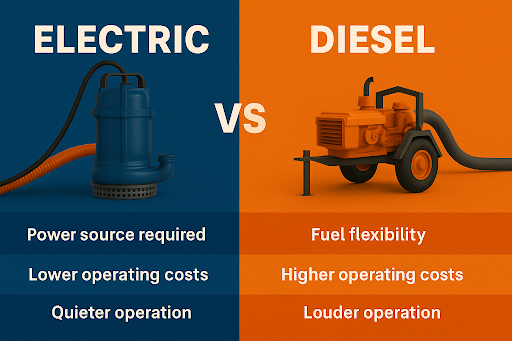
In the pump industry, performance testing is a non-negotiable step that validates whether a pump performs as promised before it reaches the field. Especially when dealing with critical applications — be it agriculture, water supply, firefighting, or industrial systems — performance testing ensures that the selected pump lives up to its specifications.
What is Performance Testing in the Pump Industry?
Performance testing in the context of pumps involves running the pumpset under controlled conditions to verify that it meets the design specifications. This pre-deployment check assesses the real-world operational capabilities of a Kirloskar pump or any other reputed make, helping prevent future breakdowns or underperformance.
Key Parameters Tested
Several key parameters are measured during performance testing:
- Flow Rate: The volume of fluid the pump moves over time.
- Head: The height to which the pump can raise water.
- Efficiency: The ratio of useful hydraulic energy to the energy input.
- Vibration: Indicates mechanical health; excessive vibration can mean future failure.
- NPSH (Net Positive Suction Head): Determines the pump’s ability to avoid cavitation, a damaging phenomenon in pumps.
Risks of Skipping Performance Testing
Deploying a pump without performance testing is akin to installing a machine blindfolded. The risks include:
- Mismatched Systems: A pump not suited to your system can lead to overloading or underperformance.
- Operational Inefficiencies: Poor flow or pressure delivery can compromise system efficiency and increase power costs.
- Premature Failure: Unchecked issues such as high vibration or cavitation can cause early wear, leading to unplanned downtime and repairs.
Certification and Compliance
Performance testing is not only a best practice — it is often a legal and quality requirement. Pumps should be tested according to standards like ISO 9906, BIS (Bureau of Indian Standards), and manufacturer-specific certifications. These standards ensure that what’s promised on paper is delivered in practice.
Customer Assurance and Cost Savings
For end-users, especially those searching for pump manufacturers near me, performance-tested pumps mean peace of mind. A tested Kirloskar pump ensures fewer maintenance issues, reduced operating costs, and enhanced lifecycle performance. It’s a strategic investment in operational reliability.
Testing Facilities and Standards
At VEMC, we operate state-of-the-art testing bays to ensure every pumpset meets industry norms and client expectations. Our facilities are aligned with international and Indian standards, and every Kirloskar pump supplied is thoroughly tested before dispatch.
In conclusion, performance testing is not just a technical step — it’s a quality promise. Before you deploy any pumpset, ensure it’s been rigorously tested. If you’re searching for ‘pump manufacturers near me’, choose VEMC for certified, tested, and performance-assured Kirloskar pump solutions. Contact us today at +91 8976951701, +91 98199 07445 or 022 43117133. Alternatively, you can also email us at marketing@vemc.co.in.


















